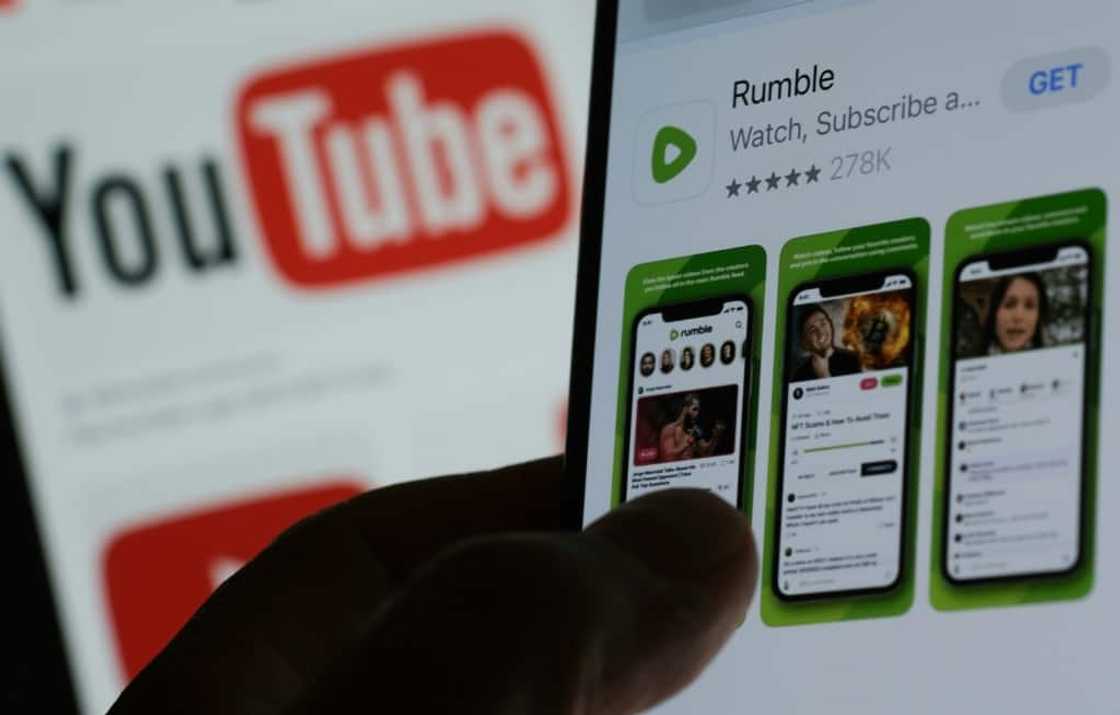Right-wing video site Rumble grows, as does its misinformation

Source: AFP
PAY ATTENTION: Never miss breaking news – join Briefly News' Telegram channel!
The video-sharing platform Rumble, flush with cash after a $400 million investment, is pushing toward its goal of becoming the YouTube for American conservatives, even as it faces criticism for allowing misinformation and conspiracy theories to proliferate.
Its monthly active user base rose to 80 million at the end of December, more than double the year-earlier figure, the company said on Thursday.
And although it posted a net loss of $11.4 million, annual revenues -- mostly from advertising -- quadrupled in the past 12 months to $39.3 million.
The growth puts Canada-based Rumble ahead of US social media rivals Parler and Gettr as it seeks to cement its role as the go-to platform for right-wing activists who claim they are "censored" by large tech firms for misinformation.
Backers include conservative investor Peter Thiel and Republican J.D. Vance, the recently elected US senator from Ohio. Last year's cash infusion came as Rumble went public with a book value of $2 billion.
"It's really the only place you can get true authenticity, period. You can't get that anywhere else," founder and chief executive Chris Pavlovski said of the platform after its earnings report.
PAY ATTENTION: Follow Briefly News on Twitter and never miss the hottest topics! Find us at @brieflyza!
But critics say Rumble's rise has come with different, non-financial costs.
Although it promotes itself as a "neutral" platform, its limited content moderation offers a home to conspiracy theories about Covid-19, the 2020 election and more.
Rumble's 2022 video "Died Suddenly" -- based on the debunked premise that Covid-19 vaccines caused numerous deaths -- was viewed nearly 18 million times. And a video dubbed "2,000 Mules," promoting false claims of vote fraud in 2020, got more than two million views.
But Rumble knows and serves its users; the March 30 news of Donald Trump’s indictment saw the platform’s top results dominated by supporters of the former president.
Rumble hosts high-profile commentators who have faced bans or critical fact-checks on other platforms, including Donald Trump Jr, former White House aide Steve Bannon and Infowars founder Alex Jones. Comedian Russell Brand moved to Rumble after other platforms restricted his videos promoting Covid conspiracies and promoting unproven cures.
The company has launched a verification badge program, and insists it is about more than US politics; Rumble is moving into live sports such as skateboarding and UFC fighting, and it also features animal and family-friendly videos.
But for the most part, "they are leaning into the story of cancel culture," says Megan Squire, a researcher with the Southern Poverty Law Center who studies online extremism.
"They are creating echo chambers where there is very little left-of-center content. It’s really gone to a right-wing slant," she said.
Dwarfed by YouTube

Source: AFP
Despite its fast growth, Rumble remains relatively small compared with Google-owned YouTube, which has an estimated more than two billion users worldwide.
A Pew Research Center report from December 2022 found that 20 percent of US adults had heard of Rumble but just two percent regularly got news from the platform. Three-fourths of Rumble users identified as Republican or Republican-leaning, Pew said.
NewsGuard, a media analytics platform that rates the credibility of news sites, reported last year that nearly half the search results on Rumble that related to the 2022 election came from sources rated as untrustworthy. It called the platform "hoax central."
Rumble said it does have a moderation policy -– banning obscenity, stalking and doxing, or maliciously posting personal information –- while steering clear of anything that might curb "open discourse."

Source: AFP
But Ahmed Al-Rawi, a professor and director of the Disinformation Project at Canada’s Simon Fraser University, said the company is taking advantage of uncertainty in social media, with platforms struggling with rules on content moderation and deplatforming.
"Their business model is focused on getting more users and getting content to spread virally," Al-Rawi said, noting that Rumble offers incentives to high-profile influencers who post first on its platform.
"This helps guarantee an audience to spread their ideas," he added.
Samuel Woolley, a professor at the University of Texas Center for Media Engagement, said that while Rumble may never rival YouTube, it nonetheless has considerable influence, built on its "completely different news reality."
"It fractures people's understanding of news and information and creates a space in which empirical truth can be disputed without any substantive refutation," Woolley said.
PAY ATTENTION: Сheck out news that is picked exactly for YOU ➡️ click on “Recommended for you” and enjoy!
Source: AFP




